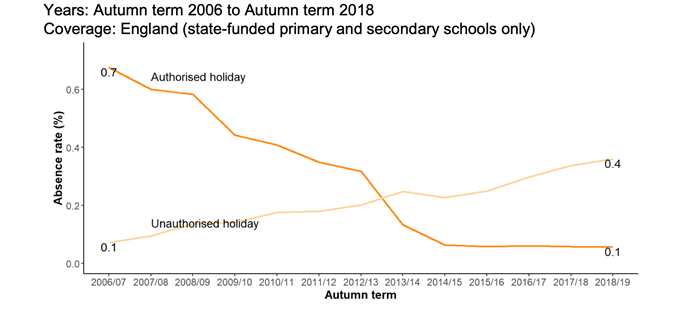Going to school or work is important, but not as important as mental wellbeing and health. Rachel Wright argues why schools need to stop giving out attendance awards.

‘Four reasons my son won’t be collecting his 100% attendance award’ became a social media viral phenomenon in 2017.
As a blogger and author of a couple of books, I have spent hours crafting and editing words in the hope they resonate and impact people’s lives. It was therefore typical that while curled up on the sofa one Friday night, half watching a romantic comedy, I fired off a couple of hundred words into Facebook that ended up circling the globe and being seen by over four million people. If only I’d sold that many books! The four points of the blog were simple.
Since I pressed ‘post,’ the story caused controversy around the world, hitting the national press and radio. On the one hand, many felt the merits of attendance awards were abundantly clear. Children who go to school have more chance to learn and live more successful lives.
The government’s own research shows the more children go to school, the better they do in exams, although this particular piece of research is fairly vague on other defining factors. Statistics released earlier this year show the majority of absences are due to sickness, highest in schools with special educational needs, and unauthorised absences continue to rise year on year, despite overall absences going down.

Pupil absence in schools in England, autumn term 2018
A vital role of schools is to inspire students to view hard work and perseverance as fundamental in making a difference to their lives. Yet attendance awards have the underlying message that pupils are rewarded for things they have absolutely no control over, whether it is a term-time holiday or chicken pox.
If ‘attendance awards’ are being handed out then, like fines, they ought to be targeted at the parents.
Interestingly, the government has always considered parent/carers responsible for children’s absenteeism. Aside from raiding a six-year-old’s piggy bank to pay the local authority’s (LA’s) fine, the government identifies that it is the parent who decides whether a child goes to school, stays home sick or flies off to Spain.
If ‘attendance awards’ are being handed out then, like fines, they ought to be targeted at the parents. A cask of wine, free afterschool clubs or a packed lunch making service are all possible suggestions which might just motivate parents.
Attendance awards have always gone straight from the school bag to recycling bin in our house because our eldest child has severe and life-limiting disabilities.
Our family values state we value and support all people. One child is not rewarded for avoiding hospital appointments, medical emergencies or chronic conditions. It is important my children know any physical or emotional vulnerability they have does not single them out, rather it is an opportunity for us to adapt, support and nurture.

There are stories of children missing out on end of year trips because chemotherapy treatment reduced their attendance percentage. Infant school pupils sitting in class watching their peers play on a bouncy castle put on for the children who achieved their ‘attendance target.’
There are schools who treat their staff with the same contempt by promoting attendance rewards on teachers too. Attendance awards suggest showing up is good enough – is that the message senior leadership teams want to place on their staff and pupils?
Going to school or work is important but it isn’t more important than health, grief or mental wellbeing. The underlying toxic message of attendance awards is that strong is good, healthy is best, sickness and fragility should be avoided, minimalised and marginalised. For a community of staff and pupils to thrive it needs the opposite of these values. A nurturing community values the teachers and students over productivity, fosters kindness, facilitates hard work and celebrates diversity.
Attendance awards have the potential for a more sinister side in the playground, especially with the infamous ‘weekly class attendance award.’ I have walked alongside children at school discussing their frustration that a particular child in their class prevents them from ever receiving the end of week class attendance certificate because they are frequently sick.
If the majority of children receive an award for attendance, with the struggling select few left without, the impact is shame. If the collective fail to receive an award because of the vulnerable or disadvantaged, it is toxic to the community and has the potential to perpetuate bullying. Attendance awards, particularly 100% attendance awards, are the antipathy of a community founded on equity, diversity and inclusion.
In every other aspect of school life, targets are expected to be SMART. Yet school attendance is presented to children as a blanket target which is anything but SMART. Attendance strategies which are specific, measurable, achievable, relevant and timely are much more likely to be successful. Most importantly, targets need to be specific to the child and their family, not the school or Ofsted.
Ofsted identifies co-production with parents as an essential aspect of an outstanding school. A passion for bridging the gap between parents and professionals has resulted in the development of CPD accredited training for schools who want to communicate effectively and work co-productively with parents and carers.
Attendance awards have the underlying message that pupils are rewarded for things they have absolutely no control over
Attendance does not happen in isolation. Government statistics show that persistent absenteeism occurs within a small percentage of families. Bridging the gap between the school and those families, listening to understand, building trust and co-producing strategies will equip a school in the best way to respond. Schools who avoid the toxicity of attendance awards through creative, inclusive and nurturing practices will:
The Leading Parent Partnership Award supports schools in developing positive relationships with parents. The framework encourages parents to be involved in their children's learning leading to improved outcomes in all aspects of school life.
To find out more, visit the AwardPlace website.